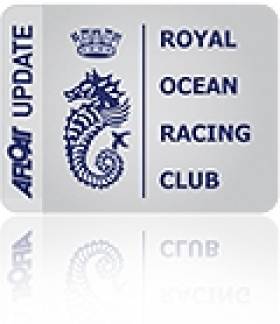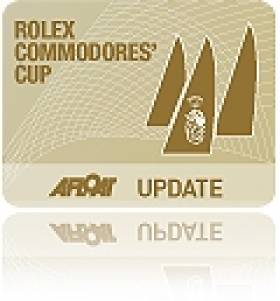Displaying items by tag: Quokka 8
Boyd's Quokka 8 Success at RORC's Caribbean 600 Trophy
#rorc – In another indication of the potency of this Summer's Irish Commodore's Cup team, the latest signing Quokka 8 skippered by Michael Boyd of the Royal Irish Yacht Club, has finished second overall in IRC2 at last week's RORC Caribbean 600 Trophy. Results here.
Last month, Irish team mates on the American Ker 40, Catapult, skippered by Peter O'Leary, achieved third overall in Key West regatta in Florida, leading Irish Commodore's Cup officials to conclude that Ireland has a winning combination for the Solent this Summer.
In a month of building excitement for ICRA and its Cup plans, it was finally announced an American and a British yacht would join Royal Cork's Antix to form the 'Green Team' for Ireland.
Although Afloat.ie accurately predicted the team line up some week's beforehand, refering to the team as 'Irish sailing's worst kept secret', such predictions were dismissed by ICRA Commodore Nobby Reilly as 'rumour'. Reilly took to Afloat.ie's popular comment section: 'Worst kept secret? The contracts have only just been signed so Afloat's original report was just a rumour. Fact is ICRA had 4 very competitive boats to choose from', he wrote.
The three boat team is Catapult, a Ker 40 owned by Mark Glimcher of the United States; Anthony O'Leary's Ker 39, Antix from Royal Cork; and the RORC Yacht Quokka, a Grand Soleil 43, being chartered by Royal Irish sailors Michael Boyd and Niall Dowling.
Although there will be a strong Irish crew involvement on all three boats comprising of sailors who first won the Cup for Ireland in 2010. Crew list announcements are awaited.
Meanwhile in Antiqua, Wwith all 60 yachts accounted for, the Royal Ocean Racing Club announced that the winner of the RORC Caribbean 600 Trophy for the best yacht, overall in IRC on corrected time, was George Sakellaris' RP72, Shockwave. The trophy was presented to the Shockwave crew at a Prize Giving held at the Antigua Yacht Club.
"I have a great crew and it was an excellent race, lots of wind and the racing was very close," commented Shockwave's owner/driver George Sakellaris, shortly after finishing the race. "I have done many offshore races but this is the first time I have raced this one and it was against tough opposition. I think the winds were favourable to us and the Shockwave team used that to our advantage. At the end of the day, winning yacht races is all about the team performance more than anything else."
"That is what ocean racing should be all about," commented Shockwave tactician, Robbie Doyle. "Beautiful racing between three very tough competitors, all fighting it out the whole way. A heavy-weight battle without a doubt - no question. I have had great moments in sail boats, but that was as much fun as I can remember. For 600 miles we were always in touch with each other, either up a few minutes or down a few minutes, and it all came down to the last beat to finish. It was like an epic tennis match. Every sail change was race critical. Bella Mente is a magic bullet when power reaching; we knew that before the start, so we set about minimising the time lost."
Robbie Doyle continued, "Bella Mente did a nice job getting through the lee of Guadeloupe by going inshore and at that time she had her time on us. All we tried to do was to stay in touch with her because we knew the race wasn't over. The critical point in the race happened just after Barbuda when Bella Mente got under a cloud and literally stopped and we sailed right up to them. After that we knew that if we just stayed in touch, the win would go to Shockwave - that's yacht racing for you, but what a fantastic experience."
"With all of the yachts now accounted for, the racing team can join the competitors at tonight's Prize Giving for a memorable occasion," commented RORC Racing Manager, Nick Elliott. "There have been some retirements, but we are delighted that there has been only minor damage to yachts. Apart from the expected knocks and bruises for a 600 mile race, everyone is safely ashore and looking forward to a great party."
British Yacht Penalised in Commodores' Cup
A British yacht in the Rolex Commodores' Cup and one of Ireland's main rivals for the title has been penalised for breaking a Cup rule that limits the number of professional crew (Group 3) that may sail on each boat.
Quokka 8, a class two entry, is part of Team GBR Red, the first of three Royal Yachting Association (RYA) teams in the competition on the Solent this week.
The team lies second overall to Ireland who have established a runaway lead in the five nation event.
The International jury found Quokka had exceeded the number of Group 3 sailors allowed.
The Cowes based Commodores' Cup is strongly Corinthian: only two Group 3 sailors are allowed on the Class 1 boats and just one aboard Class 2 and 3 entries.
After a hearing on Monday evening, a 10% penalty was imposed on the top British yacht for the first four races of the series.
Quokka 8 is skippered by Peter Rutter, a former Commodore of the Race Organisers, the Royal Ocean Racing Club (RORC).
Rutter is the team captain of GBR Red.
Quokka is currently at sea competing in the event's offshore race and is expected back in Cowes with the rest of the 30–boat fleet this afternoon.
After a recalculation of the overall points, to include the penalty on Quokka, Team GBR Red stay second behind Ireland but all that may change after the finish of the 180 mile race this afternoon.
The official Jury Decision is available to download below































































